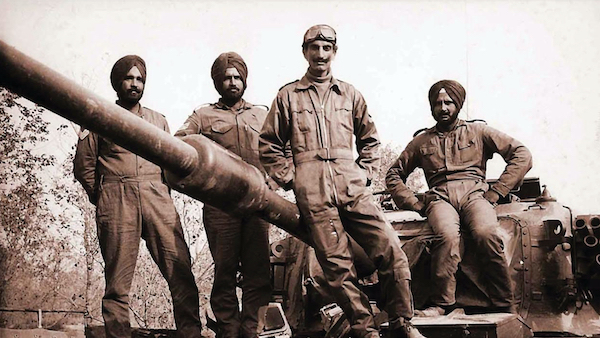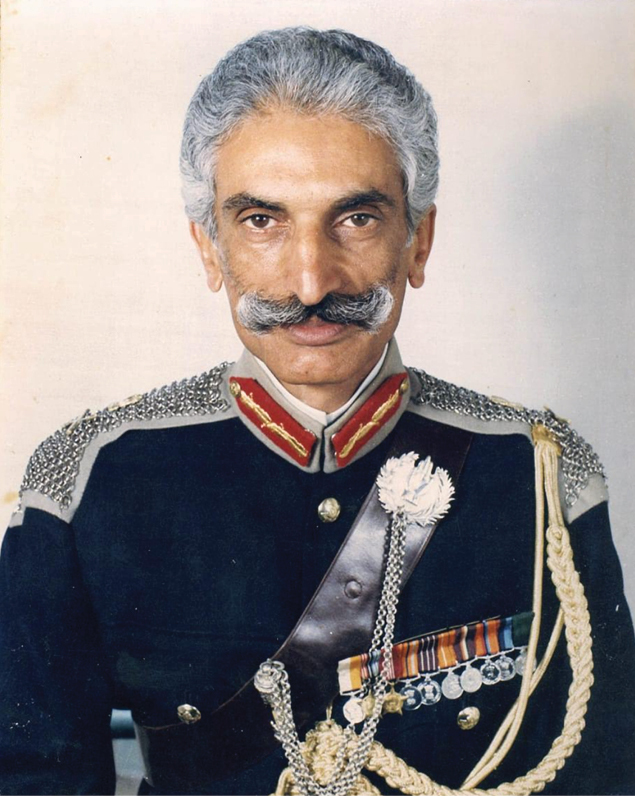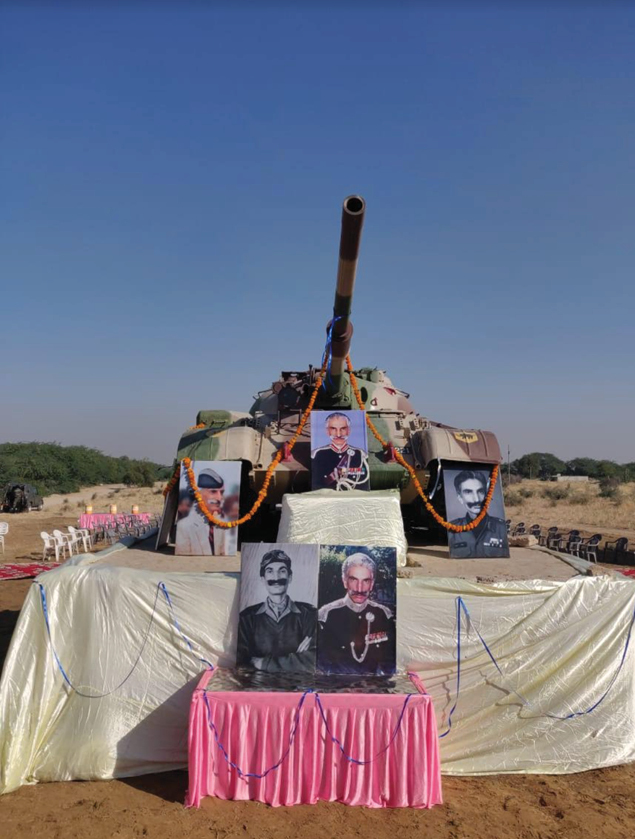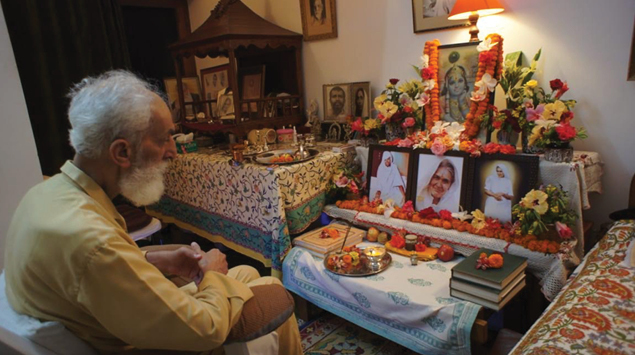Badminton: India, Poona Horse
| Line 2: | Line 2: | ||
|- | |- | ||
|colspan="0"|<div style="font-size:100%"> | |colspan="0"|<div style="font-size:100%"> | ||
| − | This is a collection of articles archived for the excellence of their content.<br/> | + | This is a collection of articles archived for the excellence of their content.<br/> |
| − | + | Additional information may please be sent as messages to the Facebook <br/>community, [http://www.facebook.com/Indpaedia Indpaedia.com]. All information used will be gratefully <br/>acknowledged in your name. | |
| − | + | </div> | |
| − | + | ||
| − | + | ||
|} | |} | ||
| − | |||
| − | |||
| − | |||
| − | |||
| − | |||
| − | |||
| − | |||
| − | |||
| − | |||
| − | |||
| − | |||
| − | |||
| − | |||
| − | |||
| − | |||
| − | |||
| − | |||
| − | |||
| − | |||
| − | |||
| − | |||
| − | |||
| − | |||
| − | |||
| − | |||
| − | |||
| − | |||
| − | |||
| − | + | =The Battle of Basantar/ Lt. General Hanut Singh= | |
| − | + | [https://timesofindia.indiatimes.com/india/the-indian-commander-whose-regiments-bravery-was-even-honoured-by-the-enemy/articleshow/79779583.cms Parul Kulshrestha, December 18, 2020: ''The Times of India''] | |
| − | + | [[File: Lt. General Hanut Singh.jpg|Lt. General Hanut Singh <br/> From: [[https://timesofindia.indiatimes.com/india/the-indian-commander-whose-regiments-bravery-was-even-honoured-by-the-enemy/articleshow/79779583.cms Parul Kulshrestha, December 18, 2020: ''The Times of India'']|frame|500px]] | |
| − | The | + | [[File: SWEET VICTORY- (L to R) Daffadar Kushal Singh tank gun loader and radio operator; Daffadar Harjinderpal Singh tank driver; Lt Col Hanut Singh, Commandant The Poona Horse; Daffadar Dalip Singh tank gunner.jpg|SWEET VICTORY: (L to R) Daffadar Kushal Singh tank gun loader and radio operator; Daffadar Harjinderpal Singh tank driver; Lt Col Hanut Singh, Commandant The Poona Horse; Daffadar Dalip Singh tank gunner Photo was taken on the day after the cease fire on Dec 17, 1971 <br/> From: [https://timesofindia.indiatimes.com/india/the-indian-commander-whose-regiments-bravery-was-even-honoured-by-the-enemy/articleshow/79779583.cms Parul Kulshrestha, December 18, 2020: ''The Times of India'']|frame|500px]] |
| − | + | [[File: Lt Gen Hanut Singh- The leader whose cool courage inspired his men to remain steadfast and perform commendable acts of gallantry.jpg|Lt Gen Hanut Singh: The leader whose cool courage inspired his men to remain steadfast and perform commendable acts of gallantry <br/> From: [https://timesofindia.indiatimes.com/india/the-indian-commander-whose-regiments-bravery-was-even-honoured-by-the-enemy/articleshow/79779583.cms Parul Kulshrestha, December 18, 2020: ''The Times of India''] |frame|500px]] | |
| − | + | [[File: Commemoration of beginning of year-long celebrations of victory of 1971 war against Pakistan at Lt Gen Hanut Singh ji war memorial at Jasol, Rajasthan.jpg|Commemoration of beginning of year-long celebrations of victory of 1971 war against Pakistan at Lt Gen Hanut Singh ji war memorial at Jasol, Rajasthan <br/> From: [https://timesofindia.indiatimes.com/india/the-indian-commander-whose-regiments-bravery-was-even-honoured-by-the-enemy/articleshow/79779583.cms Parul Kulshrestha, December 18, 2020: ''The Times of India''] |frame|500px]] | |
| − | + | [[File: THE SAINT SOLDIER- After retirement Lt Gen Hanut Singh dedicated his life to books and meditation.jpg|THE SAINT SOLDIER: After retirement Lt Gen Hanut Singh dedicated his life to books and meditation <br/> From: [https://timesofindia.indiatimes.com/india/the-indian-commander-whose-regiments-bravery-was-even-honoured-by-the-enemy/articleshow/79779583.cms Parul Kulshrestha, December 18, 2020: ''The Times of India''] |frame|500px]] | |
| − | + | JAIPUR: The name of Lt. General Hanut Singh resonates with bravery, integrity, fearlessness and compassion. Considered to be one of the greatest commanders of the Indian Army, Battle of Basantar in 1971 was Singh’s finest hour for which he was awarded with the Maha Vir Chakra. | |
| − | + | Hanut Singh was born on July 6, 1933 at Jasol in Barmer. His father Col Arjun Singh had served in Jodhpur Lancers and commanded Kachhawa Horse. He was said to be a voracious reader and was very interested in Rajput history and tradition in which he took great pride. After passing out from the Indian Military Academy, Hanut was commissioned into The Poona Horse in 1952. | |
| − | + | Battle of Basantar is considered to be the fiercest tank battle in Indian military history. While the war was going on in the eastern front, India conducted operations in Shakargarh Bulge on the Western front. Shakargarh bulge in Punjab has always been a strategic area of importance for India as it threatened the road links between Jammu and Indian Punjab. Hence, it was crucial for India to secure the region. When the war broke out December 3, 1971 and by December 15, 1971 The Poona Horse under command of Lt Col Hanut Singh had reached the Basantar River and was tasked to cross the enemy anti tank minefield laid in the dry bed of the Basantar river. | |
| − | + | The Engineer Corps was given the task to clear the minefield, but till night, it was only partially done on account of the sandy river bed. Realising the gravity of the developing situation Hanut decided to move his regiment across the uncleared minefield on night of 15 December and after sometime, without any causality they were successful. | |
| − | + | Major General V K Singh, in his book ‘Leadership in the Indian Army’, describing the battle stated that after crossing the minefield Singh divided A, B and C squadrons in three different sectors in the bridgehead to take on the enemy counter attack. A fierce tank battle was fought on December 16 and 17. | |
| − | + | Hanut ordered his officers “Fight from wherever you are and no tank will move back even an inch.” | |
| − | + | His men, being immensely loyal to him, fought till their last breath. It was during this battle that Second Lieutenant Arun Khetrapal destroyed 10 enemy tanks before achieving martyrdom. During the action Khetrapal was asked by his superior to pull back and leave his tank which had caught fire to which he replied, “Didn’t you hear the CO’s transmission? No tank will pull back even an inch.” He was rewarded with the Param Vir Chakra posthumously for gallantry beyond the call of duty. He was 21 years of age. | |
| − | + | Pakistan’s 13 Lancers and 31 Cavalry, equipped with Patton tanks lost 48 tanks in this action and were operationally crippled. The unprecedented bravery showed by The Poona Horse earned praise from Pakistan army as well that called the regiment ‘Fakhr-e-Hind’. | |
| + | The citation of Singh for the Maha Vir Chakra reads, “Undeterred by enemy medium artillery and tank fire, Lieutenant Colonel Hanut Singh moved from one threatened sector to another with utter disregard for his personal safety. His presence and cool courage inspired his men to remain steadfast and perform commendable acts of gallantry.” | ||
| + | After a decade, in 1982, as a Major General, Hanut Singh was posted by Indian army MS Branch to command 17 Mountain Division in Sikkim. Just like today, Chinese were constantly intruding into Indian territory trying to pressurise and overawe the Indian troops deployed there. | ||
| − | + | Major General Hanut Singh took the matter into his own hands. He visited all the brigades in Sikkim where he held Sainik Sammelan. | |
| + | Retired Brigadier of The Poona Horse, Karan Singh Rathore who was also part of that sammelan recalls that they were given orders to open fire on Chinese after three warnings until they vacate Indian territory. “The senior officers present were ordered that if any of them became hesitant in firing which resulted in Indian casualties, he would court martial that person for cowardice,” said Rathore. The message was loud and clear to the Chinese that a new leader had arrived. | ||
| − | + | After retirement Hanut Singh shifted to Dehradun, dedicated his life to books and meditation. He passed away on April 11, 2015. | |
| − | + | [[Category:Defence|P | |
| + | POONA HORSE]] | ||
| + | [[Category:India|P | ||
| + | POONA HORSE]] | ||
| + | [[Category:Pages with broken file links|POONA HORSE]] | ||
Revision as of 09:54, 25 December 2020
This is a collection of articles archived for the excellence of their content. |
The Battle of Basantar/ Lt. General Hanut Singh
Parul Kulshrestha, December 18, 2020: The Times of India
[[File: Lt. General Hanut Singh.jpg|Lt. General Hanut Singh
From: [Parul Kulshrestha, December 18, 2020: The Times of India|frame|500px]]

From: Parul Kulshrestha, December 18, 2020: The Times of India

From: Parul Kulshrestha, December 18, 2020: The Times of India

From: Parul Kulshrestha, December 18, 2020: The Times of India

From: Parul Kulshrestha, December 18, 2020: The Times of India
JAIPUR: The name of Lt. General Hanut Singh resonates with bravery, integrity, fearlessness and compassion. Considered to be one of the greatest commanders of the Indian Army, Battle of Basantar in 1971 was Singh’s finest hour for which he was awarded with the Maha Vir Chakra.
Hanut Singh was born on July 6, 1933 at Jasol in Barmer. His father Col Arjun Singh had served in Jodhpur Lancers and commanded Kachhawa Horse. He was said to be a voracious reader and was very interested in Rajput history and tradition in which he took great pride. After passing out from the Indian Military Academy, Hanut was commissioned into The Poona Horse in 1952.
Battle of Basantar is considered to be the fiercest tank battle in Indian military history. While the war was going on in the eastern front, India conducted operations in Shakargarh Bulge on the Western front. Shakargarh bulge in Punjab has always been a strategic area of importance for India as it threatened the road links between Jammu and Indian Punjab. Hence, it was crucial for India to secure the region. When the war broke out December 3, 1971 and by December 15, 1971 The Poona Horse under command of Lt Col Hanut Singh had reached the Basantar River and was tasked to cross the enemy anti tank minefield laid in the dry bed of the Basantar river.
The Engineer Corps was given the task to clear the minefield, but till night, it was only partially done on account of the sandy river bed. Realising the gravity of the developing situation Hanut decided to move his regiment across the uncleared minefield on night of 15 December and after sometime, without any causality they were successful.
Major General V K Singh, in his book ‘Leadership in the Indian Army’, describing the battle stated that after crossing the minefield Singh divided A, B and C squadrons in three different sectors in the bridgehead to take on the enemy counter attack. A fierce tank battle was fought on December 16 and 17.
Hanut ordered his officers “Fight from wherever you are and no tank will move back even an inch.”
His men, being immensely loyal to him, fought till their last breath. It was during this battle that Second Lieutenant Arun Khetrapal destroyed 10 enemy tanks before achieving martyrdom. During the action Khetrapal was asked by his superior to pull back and leave his tank which had caught fire to which he replied, “Didn’t you hear the CO’s transmission? No tank will pull back even an inch.” He was rewarded with the Param Vir Chakra posthumously for gallantry beyond the call of duty. He was 21 years of age.
Pakistan’s 13 Lancers and 31 Cavalry, equipped with Patton tanks lost 48 tanks in this action and were operationally crippled. The unprecedented bravery showed by The Poona Horse earned praise from Pakistan army as well that called the regiment ‘Fakhr-e-Hind’. The citation of Singh for the Maha Vir Chakra reads, “Undeterred by enemy medium artillery and tank fire, Lieutenant Colonel Hanut Singh moved from one threatened sector to another with utter disregard for his personal safety. His presence and cool courage inspired his men to remain steadfast and perform commendable acts of gallantry.” After a decade, in 1982, as a Major General, Hanut Singh was posted by Indian army MS Branch to command 17 Mountain Division in Sikkim. Just like today, Chinese were constantly intruding into Indian territory trying to pressurise and overawe the Indian troops deployed there.
Major General Hanut Singh took the matter into his own hands. He visited all the brigades in Sikkim where he held Sainik Sammelan. Retired Brigadier of The Poona Horse, Karan Singh Rathore who was also part of that sammelan recalls that they were given orders to open fire on Chinese after three warnings until they vacate Indian territory. “The senior officers present were ordered that if any of them became hesitant in firing which resulted in Indian casualties, he would court martial that person for cowardice,” said Rathore. The message was loud and clear to the Chinese that a new leader had arrived.
After retirement Hanut Singh shifted to Dehradun, dedicated his life to books and meditation. He passed away on April 11, 2015.